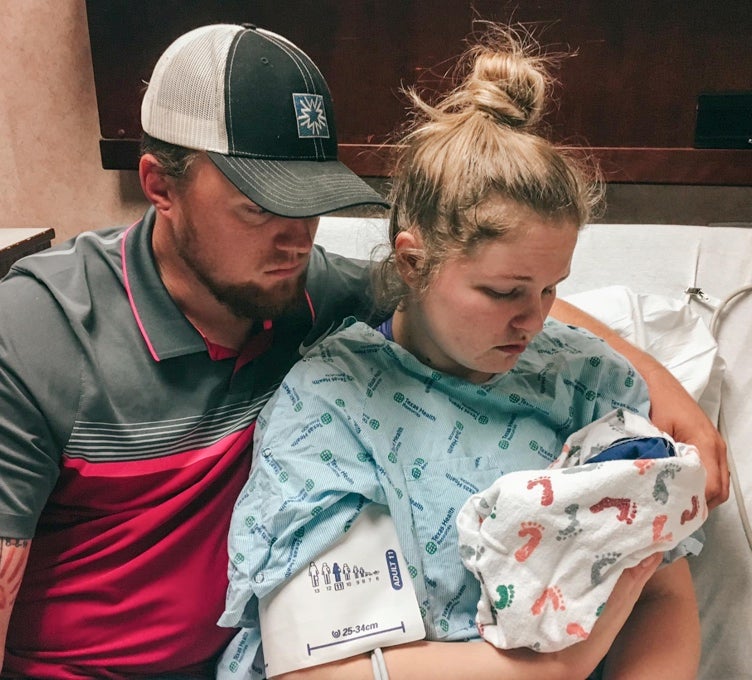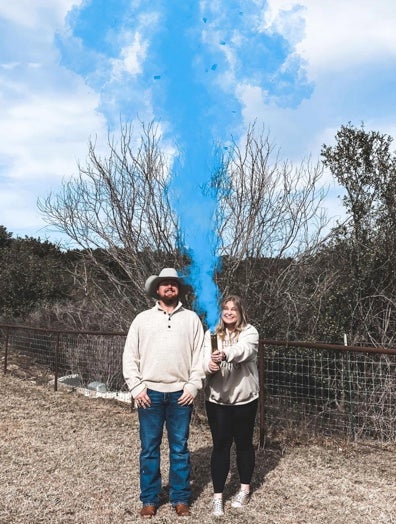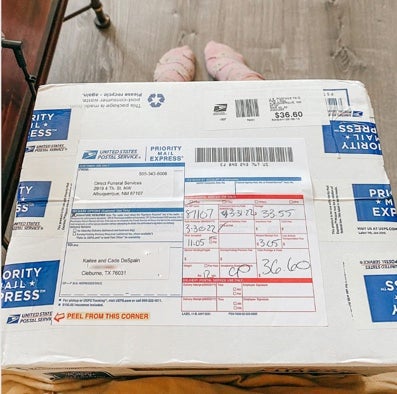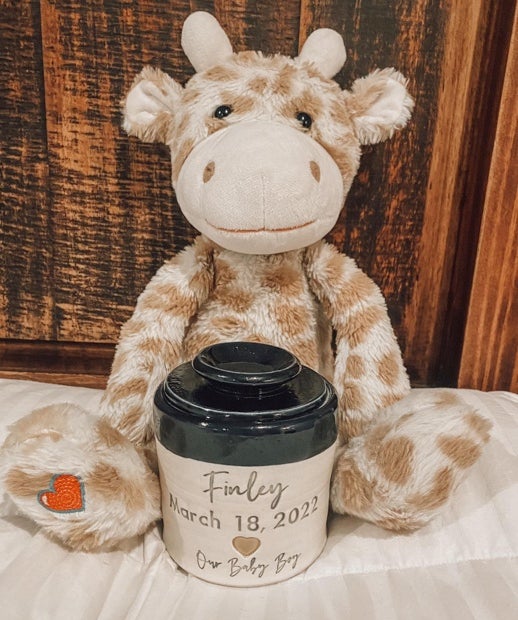
Her baby was going to die. It was highly likely that she was also going to die. The state of Texas refused to do anything.
Instead, the only option for Kailee DeSpain was to make the 10-hour drive to New Mexico to have an abortion to save her life and then to have the ashes of the son that she and her husband so desperately wanted shipped back home in the mail.
This is the reality of America in 2022.
“My doctors said to me: ‘We’re going to be blunt – you have to be dying on the table and we have to be able to prove that before we can intervene,’” Ms DeSpain tells The Independent.
“Texas doesn’t have a law that covers the time period from the moment the doctor finds out there are complications to the moment the complications actually start. They have to allow the complications to start and just hope it’s not too late.”
Ms DeSpain was pregnant with baby Finley before the US Supreme Court overturned Roe v Wade on 24 June.
But, even before then, Texas had already introduced one of the strictest abortion bans in the country in 2021, making abortion illegal after six weeks of pregnancy or when a fetal heartbeat is detected.
Dubbed the “heartbeat bill”, SB8 offered no exceptions for rape, incest or severe fetal abnormality.
While there are exceptions for where the mother’s life is in danger, these exceptions only come into play when there is a medical emergency at that moment in time.
The fact that the mother will die if she continues with the pregnancy is not enough.
Only ‘at death’s door’
The law is endangering the lives of high-risk pregnant patients in Texas, according to a study published by the New England Journal of Medicine in June.
The research, which involved interviews with Texan clinicians and patients after SB8 was introduced and before Roe v Wade was overturned, found that patients with medically complex pregnancies or preexisting medical conditions are being denied abortion care until they are “at death’s door”.
Among them was one pregnant patient who was suffering from a rupture of membranes before fetal viability. This left her at risk of infection, sepsis, excessive bleeding or even death if she didn’t get an abortion.
But, under the state law, she could not undergo the procedure in Texas.
Her best option was to fly to another state, even though this came with the added danger of air travel.
Rather than provide the care that she needed, all her doctor could do was warn her what to do if she gave birth to her stillborn fetus mid-flight.
“If you labor on the plane, leave the placenta inside of you,” the doctor said.
“You’re going to have to deal with a 19-week fetus outside of your body until you land.”
The study found that another high-risk patient was only able to get an abortion that medics knew she needed when her cardiac condition deteriorated so severely that she was rushed to the intensive care unit.
In multiple other cases, patients were sent home only to return when they showed worrying signs of sepsis.

As one specialist cited in the study puts it: “People have to be on death’s door.”
And now, in a post-Roe world, things are poised to get even worse.
Following the Supreme Court ruling, Texas has reverted back to an outdated law from 1925, which makes providing an abortion punishable by up to 10 years in prison.
A trigger law – passed by the GOP-led Texas legislature last year – will also come into force later in the summer, banning almost all abortions from the moment of conception.
Pregnancy complications
Ms DeSpain never wanted to have an abortion.
Her pregnancy was one she and her husband had hoped and prayed for for many years.
With three other failed pregnancies and Ms DeSpain’s medical conditions including a battle with cervical cancer, their journey to parenthood has been a long and difficult one.
She was 21 when she became pregnant for the first time with baby Carlie.
At 12 weeks’ pregnant, she suffered a miscarriage. At the time, she says her doctors weren’t worried, simply telling her it “would never happen again” and that “lots of people miscarry at first”.
When she became pregnant a second time, everything seemed healthy and normal. But at 15 weeks, her body had an autoimmune response and the placenta filled with blood clots. One week later – at just 16 weeks – she went into labour and baby Chelsea was born too early to survive.
After extensive medical tests, Ms DeSpain was diagnosed with a genetic issue that causes blood clots.
“That scared us and we didn’t want to try again for a while,” she says.
Then, she was diagnosed with cervical cancer and had to have a third of her cervix removed. Doctors told her that, if the cancer returns, she will need to have a hysterectomy.
Desperate to have children before that happens, she and her husband tried again for a baby but miscarried at six weeks.
Then, one month later, Ms DeSpain found out she was pregnant for a fourth time. This time around, both the doctors and Ms DeSpain were now aware of her medical conditions and she was taking daily injections to reduce the risks of blood clotting and early labour.
As a high-risk pregnancy, Ms DeSpain had gone for several ultrasounds where the baby had a strong heartbeat and seemed perfectly healthy.

“Everything seemed normal,” she says, and, as the weeks went by, the DeSpains grew more hopeful and excited about welcoming their child into the world. They found out they were having a boy and named him Finley.
But, that all changed around 16 weeks.
“At the 16-week ultrasound I was really excited as I had carried him further than any baby and it seemed like he would be okay,” she says. “Then the ultrasound technician got very quiet and we noticed we were having trouble seeing parts of him on the screen.”
Finley had no amniotic fluid around him and it appeared that he didn’t have any kidneys.
Doctors told her that there was nothing anyone could do to save him. And there was also a danger that Ms DeSpain could go into labour at any moment.
But, desperate to save their child, Ms DeSpain went to see a team of fetal specialists in Houston. After multiple tests, the news came back even worse.
Finley didn’t have a heart chamber so blood was pooling in his heart, he was missing a kidney, his brain had split and his heart was too big. The results of genetic testing then revealed that he had triploidy, a rare chromosomal abnormality that meant he had zero chance of survival. She would either miscarry or, if the pregnancy continued to term, Finley would die within the first few days of life.
Triploidy also causes complications for the mother, including preeclampsia which leads to high blood pressure.
Given Ms DeSpain’s medical history, the risk to her was even greater than most.
“There was a high chance that I wasn’t going to make it either,” she says.
“My husband was beside himself saying ‘I don’t want this to kill my wife’.”
She needed an abortion. But – while Finley had no chance of survival and there was a strong chance the pregnancy would also kill Ms DeSpain – it was not deemed a medical emergency at that point.
So, along with dealing with the loss of their baby, Ms DeSpain says doctors told them they couldn’t give her the procedure in Texas.
A 10-hour journey
“My only option in Texas was to carry him to full term which the doctors explained to me – especially with my medical history – would be very dangerous,” she says. “They explained that it has to become an emergency for someone to intervene so the doctors could only act when I was about to die.”
With their options limited, Ms DeSpain reveals that she did consider continuing with the pregnancy – even knowing that Finley had no chance of survival and that her chances were also decreasing by the day.

“We were close to the gestational stage where babies can feel things so I thought about it a lot – what it might be like to carry him full term,” she says. “But even if I made it, I would then have watch him suffocate to death when he was born.”
They made an appointment with a clinic in New Mexico and, at 19 weeks, made the 10-hour journey to have the procedure.
Ms DeSpain remembers walking into the clinic – while grieving for her son and also undergoing painful contractions from the procedure – as anti-abortion protesters shouted at her and called her a “baby killer”.
“Someone was screaming at me through a megaphone ‘dont kill your baby’ and people were holding pro-life signs saying ‘baby killer’ and ‘murderer’,” she recalls.
“I saw red. I was so angry, I turned and looked at the woman with the megaphone and yelled back ‘my baby is dying’.
“Those people just assumed I didn’t want my baby. They didn’t know that this was a baby that had been prayed for and wanted for almost eight years.”
After the abortion, she and her husband made arrangements with a New Mexico funeral home which then mailed Finley’s ashes back to them in Texas.
Ms DeSpain explains that – though she has grieved three other pregnancies – this time was different.
“With my other lost pregnancies, there was a lot of grief for a long time,” she says.
“But I was never afraid of the circumstances that surrounded it and I never felt like if it happened again my doctors couldn’t help me. So it’s not just dealing with the loss of a child but also dealing with the grief that I may never be able to start a family because of the laws in Texas.
“It’s really exhausting. I should be safe here and I’m not... I don’t know how to explain to anyone how it feels to feel in danger.”
She is also acutely aware that the financial burden of what she had to go through is out of reach for many. In total, she estimates that it cost around $3,500 to $4,000 to pay for the procedure, the travel, the hotel, lost wages and so on.
“I think about the fact that if I hadn’t had help to pay I’d have had to stay in Texas and carry Finley as far as I could and I would have died,” she says.
“And that’s what’s going to happen to the women who can’t afford it. If women don’t have the funds to leave Texas they are going to die in Texas.”
Now, Ms DeSpain is having to come to terms with the impact the Texas abortion ban has on her chances of ever becoming a parent.

Moving states
Given her high risk of having complications with future pregnancies, her doctor has warned her that her life will be at risk if she gets pregnant again in her home state.
“I met with my doctor to discuss our next options and she told me: ‘It’s not safe for you to get pregnant again in the state of Texas. You need to understand that if you get pregnant in Texas and you have complications that I won’t be able to intervene unless I can prove you’re about to die,’” she says.
Right now, having a choice over her own body means choosing between three sombre options: stay in Texas and forget their dreams of having a baby; stay in Texas and potentially die from a complicated pregnancy; or up sticks and leave her life in Texas behind to move to a state where she will be able to get life-saving medical care if she needs it.
For her and her husband, the latter is becoming an increasing possibility, she says.
“Unfortunately we’re absolutely looking at the option of moving out of the state,” she says.
“The laws might change in time but if the cancer comes back we run out of time.”
It’s an ironic option for the so-called pro-life movement and one that means raising any future children away from their close-knit families.
“That was very important to us to be close to our parents when we have a baby,” she says.
Both she and her husband grew up in the state, with Mr DeSpain a seventh-generation Texan.
They have both got professional licences – her in teaching and him as an electrician – tied to the state.
She says they plan to wait to see the outcome of the mid-terms in Texas in November before they make any move.
“But now we are seriously looking at a future that doesn’t involve us living in Texas,” she says.
For those unwilling or unable to take such drastic steps, experts warn there will be more deaths.
Researchers in the New England Journal of Medicine study say that Texas’s abortion laws will lead to a rise in maternal mortality in the state as patients are denied much-needed abortion care.
Texas already has a maternal death rate higher than the US average, a figure that rises even further among Black women.
Ms DeSpain fears that the reality is that some women will have to die in order to expose the damage caused by the Texas’s abortion and lead to changes in the law.
“It’s frightening that that is probably what has to happen in Texas,” she says.
“I don’t want to be that case study – I don’t want to die here in Texas. I don’t want my death to have to be the reason the laws change.”







